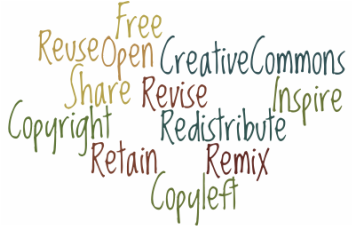I have used Creative Commons in the past. I appreciate how it allows me to enhance my work while promoting the work of another by including proper acknowledgment. Prior to reading What is Copyleft (http://www.gnu.org/copyleft) and About the Creative Commons (http://creativecommons.org/about) I didn’t fully understand how the freedom offered by open resources was actually secured through copyright. The statement in the latter article that declares that Creative Commons provides an infrastructure that creates a “balance between the reality of the Internet and the reality of copyright laws” really summed it up for me.
My closing comments will be on Aaron’s Law, the recorded lecture of Larry Lessig, Once I got past the introduction, which I will refrain from commenting on, I found it not only deeply saddening to know that we lost such an intelligent, personable, sensitive person with a social conscious at such a young age but engaging and thought provoking. I only wish I had the opportunity to meet him. He seemed to be a dichotomy of introvert and activist. Intelligent and maybe naïve at the same time.
The lecture provokes the questions: Did Aaron actually break the law in liberating the JStor database? It wasn’t clear if he actually “broke in” as the server room itself was unlocked. As a member of the institution he was, in fact, entitled to access the database. Did he exceed his authorized access? Unclear. Did he have intent to distribute? Unclear. Was there proof that his actions caused harm? Again, unclear. As an accomplished lawyer Larry Lessig was careful not to come out and state it but the way he presented certain facts and skirted around others suggested that Aaron’s prosecution was less about copyright and more related to his ability to hack into secure databases. A prospect that would surely scare a paranoid government with sensitive information to guard.
Perhaps what struck me most was not related to copyright at all. What struck me was the essence of Aaron himself. Yes, he was a hacker. Yes he was an activist. Mr. Lessig is correct on these counts. But he was also a poet. Perhaps first and foremost. I wanted to find the description Aaron wrote of the picture he attached to one of his posts because it was particularly eloquent but was unsuccessful in finding it. Here is a different sample from his Stanford blog (http://www.aaronsw.com/weblog/) where he talks insightfully and lyrically about the failing auto industry,
An organization is not just a pile of people, it’s also a set of structures. It’s almost like a machine made of men and women. Think of an assembly line. If you just took a bunch of people and threw them in a warehouse with a bunch of car parts and a manual, it’d probably be a disaster. Instead, a careful structure has been built: car parts roll down on a conveyor belt, each worker does one step of the process, everything is carefully designed and routinized. Order out of chaos.
And when the system isn’t working, it doesn’t make sense to just yell at the people in it — any more than you’d try to fix a machine by yelling at the gears. True, sometimes you have the wrong gears and need to replace them, but more often you’re just using them in the wrong way. When there’s a problem, you shouldn’t get angry with the gears — you should fix the machine.
And here is another discussing how mistakes are frequently undervalued…
This is a tale of two nonprofits.
At one, they hate making mistakes. How else could it be? “We’re not ever going to enjoy screwing up,” they told me. But this attitude has a lot of consequences. Everything they do has to go through several layers of approval to make sure it’s not a mistake. And when someone does screw up, they try to hide it.
It’s only natural — you know you’re going to get in trouble for screwing up, so you try to fix it before anyone notices. And if you can’t do, then your boss or your boss’s boss tries. And if no one in the organization can fix it, and it goes all the way to the executive director, then he tries to figure out a way to keep it from the press or spin it appropriately, so the world never finds out they made a mistake.
At the other nonprofit, they have a very different attitude. You notice it the first time you visit their website. Right in their navigation bar, at the top of every page, is a link labeled “Mistakes.” Click it and you’ll find a list of all the things they screwed up, starting with the most horribly embarrassing one (they once promoted their group under false names).
Extremely articulate and even elegant prose, I am sure you will agree, Coders will admit that there is a beauty and poeticness to eloquent code. Is it his eloquence that spawned his ability to appreciate and create brilliant code? Or has his ability to create and appreciate elegant code translated to his ability to communicate with the written word? Maybe a bot of both. The words recited from his blog posts demonstrated passion, vision and eloquence that are the hallmarks of a poet. I would suggest that it was this sensitive soul of a poet that called him to action and resulted in the torment that eventually caused him to take his life. I truly hope that he has found some peace.

